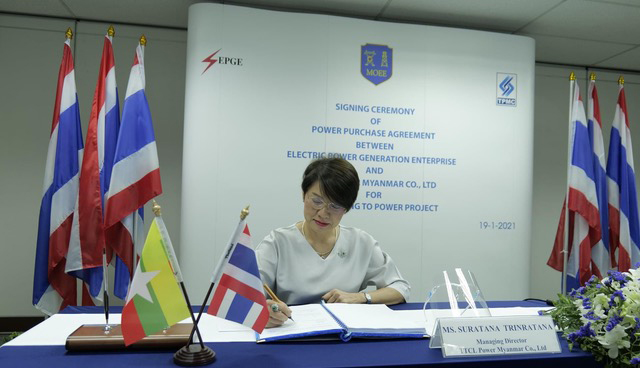YANGON — A state-owned enterprise in Myanmar has signed a power-purchase agreement with a Thai-based engineering and construction company which plans to develop a US$685 million (911 billion kyats) power plant in Yangon.
On Wednesday, the agreement was signed by Electric Power Generation Enterprise, which is controlled by the Ministry of Electricity and Energy, and TTCL Power Myanmar Company Limited, a subsidiary of Thailand’s TTCL Public Company Limited. TTCL is a joint venture between Italian-Thai Development Public Company Limited, which holds a 52-percent stake, and Japan’s Toyo Engineering Corporation, which holds the remaining 49 percent.
Italian-Thai Development is currently in dispute with Myanmar’s government over the vast Dawei Special Economic Zone in Tanintharyi Region.
TTCL planned to construct a 388-megawatt liquefied natural gas (LNG) plant in Ahlone Township, which includes the construction of a natural gas pipeline, LNG terminal and 230-kilovolt transmission line. Construction is due to take about 28 months with a 25-year concession, according to TTCL.
The ministry said TTCL has already completed a feasibility study and environmental impact assessment. The project is one of three LNG plants the ministry opened to bidding from international companies in 2018.

Electricity and energy minister U Win Khaing called on the company to work hard to complete the project within the tight schedule.
He said the company must comply with international and Myanmar regulations at all stages of construction and operation.
The project will power Yangon Region with a more stable supply, the minister said.
Just over half of Myanmar’s population is connected to the national grid, the lowest proportion in Asean. In 2019 the World Bank said Myanmar needed to invest up to $2 billion (2.7 trillion kyats) annually in its electricity sector to sustain economic growth.
While Myanmar’s peak electricity production is around 3.5 gigawatts (GW), the World Bank forecast that demand will reach 8.6GW by 2025 and 12.6GW by 2030. The ministry said electricity consumption has increased by 15-19 percent annually in recent years.
Since taking office in 2016, the National League for Democracy has prioritized LNG – natural gas super-chilled to be transported in liquid form – and smaller dams to fulfill the county’s demand rather than relying on major hydropower projects, which can be unreliable during the dry season and environmentally damaging.
Although LNG plants can be built faster, Myanmar is unable to produce LNG domestically because of the expense and advanced technology involved. The government since 2018 has called tenders for both short- and long-term LNG projects to meet increasing power demand.
Last year a joint venture between Japan’s Marubeni, Sumitomo Corporation and Mitsui and Co won a $2-billion, 1.2GW LNG project to be built at the Japanese-backed Thilawa Special Economic Zone in Yangon.
You may also like these stories:
Myanmar Workers at International Joint-Venture Construction Site Strike for Unpaid Wages
Myanmar Says Thai Firm at Dawei SEZ Breached Contract
Myanmar Secures Second IMF COVID-19 Loan

















